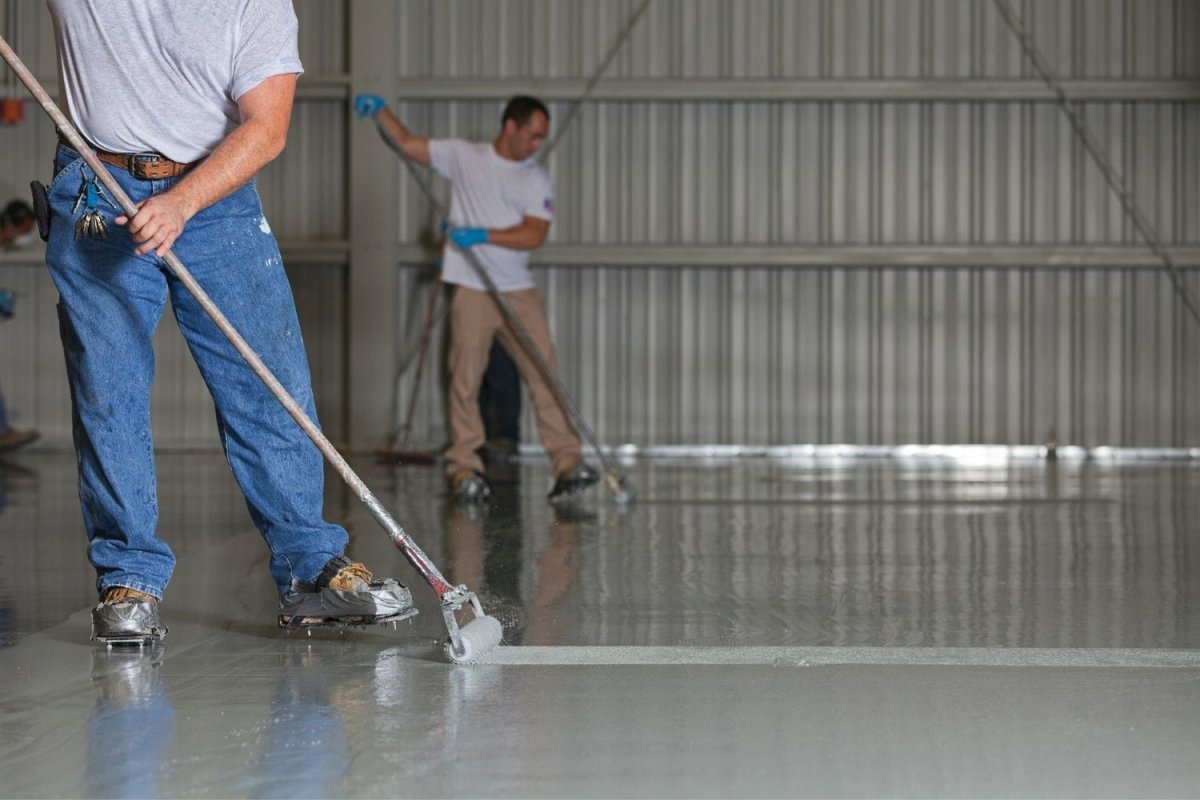

We may earn revenue from the products available on this page and participate in affiliate programs. Learn More ›
Highlights
- The typical range for epoxy garage flooring costs is $1,595 to $3,337 with homeowners paying a national average of $2,441.
- A few factors can impact the cost of epoxy garage flooring such as garage size, labor, application method, epoxy type, site preparation, and geographic location.
- Many benefits lead homeowners to choose epoxy as a garage flooring material including improved appearance, cost-effectiveness, floor protection, safety and visibility, easy maintenance, vehicle compatibility, and eco-friendliness.
- Applying epoxy is relatively straightforward, but preparing the flooring requires special tools and expertise. For this reason, it’s recommended that homeowners leave this project to a professional rather than attempting a DIY epoxy garage floor. Top companies include PremierGarage, Garage Kings, and GarageFloorCoating.com.
Homeowners who are tired of the plain concrete flooring in their garages may be interested in long-lasting epoxy flooring. Epoxy is a rugged and durable finish that will transform dull garage flooring into a gleaming surface. According to Angi and HomeAdvisor, epoxy garage floor costs range from $1,595 to $3,337, with the national average at $2,441. An epoxy floor is tough and resistant to oil, grease, and chemicals while protecting against scuffs and scrapes. This garage floor coating comes in a variety of colors and blends of decorative flakes. Epoxy is also available in metallic hues and customizable colors.
Epoxy flooring averages between $3 and $12 per square foot, including installation fees. The project’s overall price depends on the area’s square footage, the number of coats needed to fully protect the floor, and the amount of preparation required before applying the epoxy.
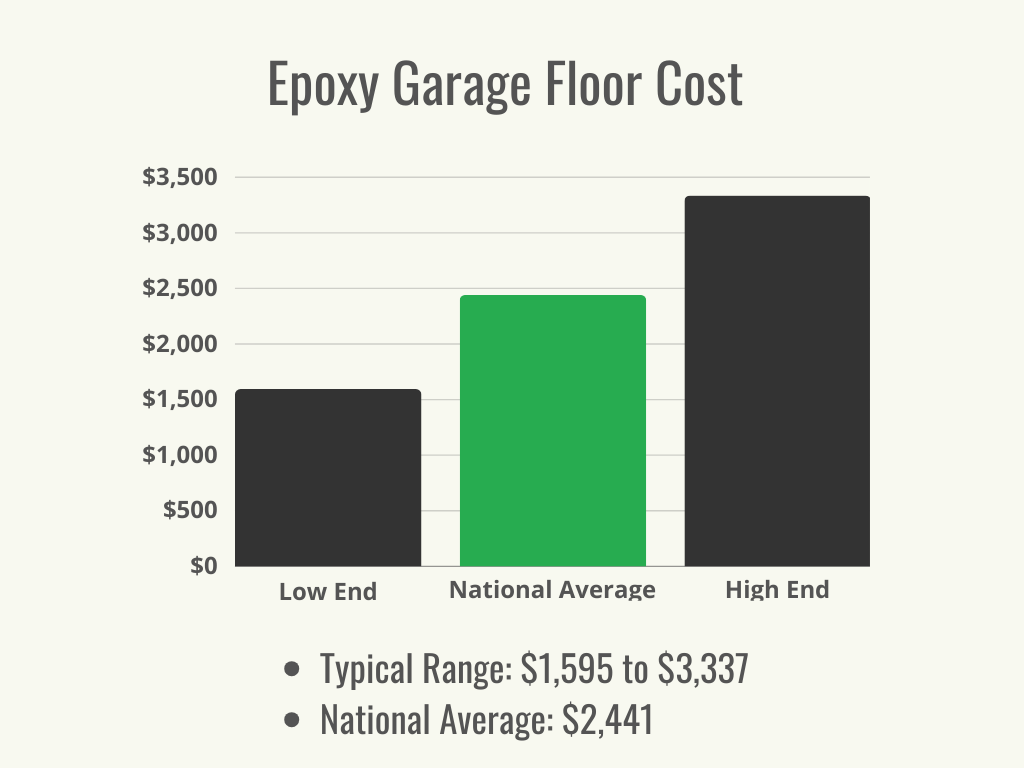
What is epoxy flooring?
Epoxy flooring is made of a thermosetting epoxide resin and a polyamine hardener. When the two items are mixed, it creates a chemical reaction that begins the curing process. The chemical reaction creates a stable and durable layer while sealing and protecting the surface to which it’s applied.
Key Cost Factors
Several factors impact epoxy garage flooring costs. Prices can differ from the national average due to garage size, labor costs, application methods, materials, equipment, epoxy type, and preparation methods.
Garage Size
A 240-square-foot one-car garage can cost between $720 and $2,900 to epoxy. A larger three- to four-car garage can cost between $1,700 and $9,500. The larger the surface, the more expensive the epoxy coating cost will be. Solvent and water-based epoxy are the cheaper options.
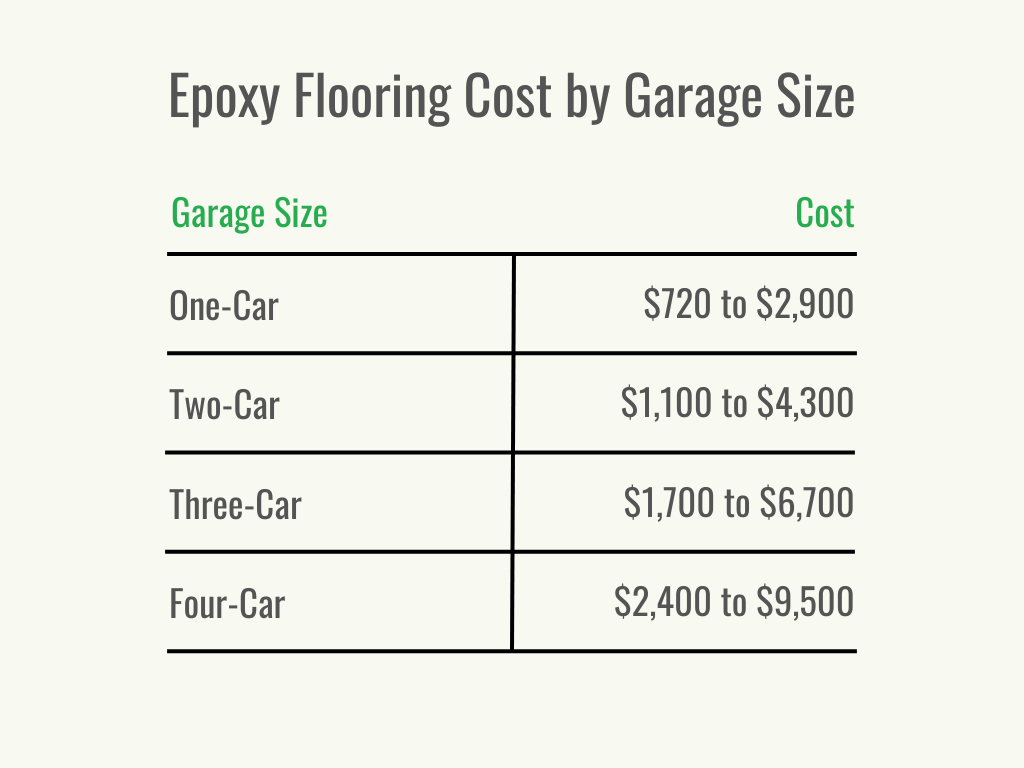
Labor
Labor costs average between $4 and $7 per square foot, or $50 to $150 per hour. Labor costs for epoxying a garage floor can account for as much as 65 percent of the project price because it takes a day to prep, a day to coat the flooring, and another day to seal it.
Application Method and Epoxy Type
Some application methods use a roller to apply the epoxy, and others require a squeegee, trowel, or sprayer. It’s a good idea to talk to the concrete professional who will install the epoxy flooring to ask about application methods since some are more labor-intensive (and therefore more expensive) than others.
Garage floor epoxy costs also depend on the type of epoxy used. Water-based epoxy is the least expensive option at $30 to $50 per gallon. Solvent-based epoxy is in the middle of the price range at about $40 to $55 per gallon. Solid epoxy is the most expensive option and can range up to $150 per gallon.
Site Preparation
Before any flooring prep can begin, the garage will need to be emptied of its contents. This includes items on the floor and on shelving around the perimeter. Homeowners can save on labor costs by moving these items themselves.
A key part of painting a garage floor is prepping the surface. Most concrete flooring will need to be acid washed or etched before the application of epoxy. This gives the epoxy a texture to grip so it can adhere to the flooring surface. Prepping the floor costs around $20 per gallon of product. The flooring will also need to be washed before etching to remove dirt, debris, and stains. For those who decide to hire a professional instead, the charge will likely fall between $1 and $5 per square foot to sandblast the floor.
Geographic Location
Labor, material costs and availability, and cost of living can affect what homeowners pay for epoxy garage flooring installation. Costs may also be relatively high in densely populated urban areas compared to what homeowners in the suburbs might pay.
| Location | Average Cost (Materials and Labor) |
| Chicago, Illinois | $1,685 to $2,825 |
| Dallas, Texas | $1,340 to $2,440 |
| Los Angeles, California | $1,395 to $3,010 |
| Miami, Florida | $1,240 to $2,685 |
| New York City, New York | $1,705 to $3,720 |
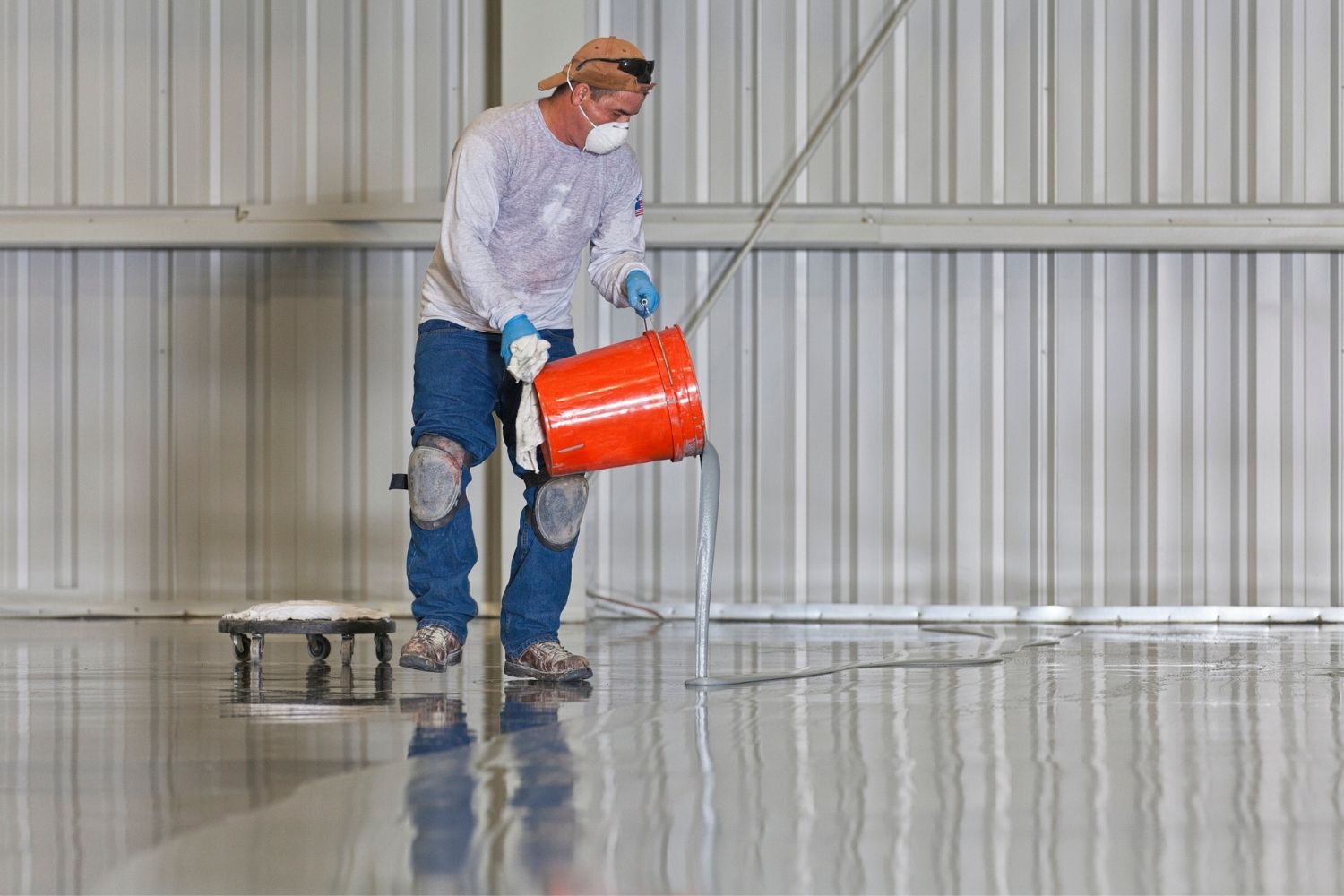
Additional Costs and Considerations
When homeowners are budgeting for epoxy garage floor costs, there are additional price factors and considerations. These can include painting and sealing concrete, storing possessions, repairing concrete, resurfacing, and traffic coating.
Concrete Painting and Sealing
Sealing concrete with urethane or high-performance epoxy averages between $1.50 and $5 per square foot. The cost to paint the floor with one of the best garage floor paints is the same.
Labor costs for sealing or painting average $40 to $150 per hour.
Concrete Repair or Resurfacing
If a concrete garage floor has chips, cracks, or is crumbling, it will need to be repaired before the epoxy can be applied. Patching costs between $25 and $250 for materials and labor. If cracks in the flooring result from foundation issues, then the foundation will need to be repaired. Foundation repairs can run from $2,200 to $7,800.
While prices can vary depending on the current concrete cost per yard, concrete resurfacing can run between $3 and $5 per square foot, including installation. A 500-square-foot garage floor can cost from $1,500 to $2,500. Keep in mind that some contractors require a $500 to $1,000 minimum charge.
Traffic Coating
For those who use their garages to store heavy vehicles like an RV, tractor, or a dual-axle truck and trailer, it may be worth it to invest in a commercial-grade floor coating. Polyurea or 100 percent solid epoxy can resist the heavier weight of the vehicles. The higher quality sealant is about 20 to 30 percent more expensive but the investment will pay off over time.
Customization
For those looking to add a decorative touch to their epoxy garage floor, there are a variety of customization options to choose from. For example, decorative flakes can be incorporated into clear epoxy and cost $10 per 250-pound bag. Metallic epoxy gives the flooring a striking shine and costs about $5 to $12 per square foot.
| Add-ons | Average Cost (Materials Only) |
| Acrylic and poly-acrylic sealant | $0.85 to $1.15 per square foot |
| Decorative flakes | $10 per bag |
| Metallic epoxy | $5 to $12 per square foot |
| Polyurea sealant | $150 per gallon |
| Polyurethane sealant | $0.95 to $1.10 per square foot |
Types of Epoxy Floor Coatings
Pricing can vary depending on the type of epoxy that is chosen. There are three types of epoxy: water-based, solvent-based, and solid epoxy. A professional installer can advise homeowners on the best epoxy resin for their project.
| Epoxy Type | Cost per Gallon |
| Solid | $45 to $150 |
| Solvent-based | $40 to $55 |
| Water-based | $30 to $50 |
Solid
Solid epoxy is the most expensive option, but it’s the most robust and most durable type of flooring epoxy. It’s a thicker epoxy—about double the thickness of water-based and solvent-based epoxy. It has no VOCs, so it’s better for the environment, and it resists heat, chemical spills, and scratches. Solid epoxy can last up to 20 years. It requires professional installation since it needs to be applied quickly. Solid epoxy is not recommended for high-moisture areas or use in extreme temperatures. The cost can run from $45 to $150 per gallon.
Solvent-Based
Solvent-based epoxy is a bit stronger than water-based, has a greater resistance to petroleum-based products, and can be applied when there’s high humidity and lower temperatures. Solvent-based epoxy application requires respirators since this option is high in VOCs and highly flammable during the application process. Some states have banned solvent-based epoxy because of the high VOCs, so homeowners will want to inquire if this type of epoxy is available in their area. The cost runs between $40 and $55 per gallon.
Water-Based
Water-based epoxy is the cheapest option for flooring. It consists of water, epoxy, and the hardener. As the epoxy cures, the water evaporates. This type of epoxy is thin, easy to apply, durable, glossy, and low in VOCs (volatile organic compounds). Water-based epoxy only resists minor scratches and chemical exposure, and it needs to be reapplied every 1 to 3 years. It can cost between $30 and $50 per gallon.

Benefits of Choosing an Epoxy Garage Floor Coating
Homeowners who have started looking into the best garage floor coatings are likely to come across epoxy in their research. Epoxy garage floor coating is considered one of the most desirable finishes. It’s durable, glossy, easy to clean, and resistant to impacts, chemicals, scratches, and stains.
Improved Appearance
Epoxy floor coating transforms a dull concrete garage floor into a glossy and gleaming surface. There are many epoxy garage floor colors and design options that complement a home’s aesthetic. It can also hide flooring imperfections like flaws in the concrete or small cracks.
Cost-Effective
Compared to other garage floor options, epoxy is a good value. It’s less expensive than other materials and offers superior durability and toughness. Choosing epoxy coating is more cost-effective than purchasing tile or vinyl and paying for installation costs.
Long Lasting
Epoxy coating lasts longer than other flooring options for garage flooring. Epoxy’s sheen and overall appearance will last for years due to its durability and protective qualities. It’s resistant to chemicals, water, shock, and stains and can provide long-term satisfaction since it’s easy to clean and maintain.
Protection and Strength
Since epoxy is a sealant, it protects the concrete flooring beneath it. The epoxy will help the concrete floor last longer because it bonds to the surface of the concrete. This strengthens the concrete and protects it from cracks and wear. Adding epoxy to the surface of a concrete floor increases the surface strength and the ability to hold significantly more weight than uncoated concrete. When the epoxy is applied correctly, it will resist tearing and peeling and withstand heavy wear and tear over time.
Safety and Visibility
Epoxy flooring reflects light to increase visibility within a garage. Many kinds of epoxy coating have a high shine that creates a refined look. This glossy surface can help the home and garage safe by increasing the amount of available light in the garage. Epoxy flooring can also include additives that increase traction and have anti-slip properties. Sand, gravel, mortar, polymer grit, and aluminum oxide can be added to the epoxy to increase the level of traction and to help avoid slips on the smooth surface. Anti-slip additives can also be requested when consulting with a flooring professional.
Easy Maintenance
Epoxy floor coatings are easy to keep clean. Dirt, dust, and debris can be swept or vacuumed before using a mild cleaning solution or soap and water. Road salt will not damage epoxy flooring, and any chemical, oil, water, or grease spills can be easily wiped up without staining.
Vehicle Compatibility
The smooth surface of epoxy flooring will not wear down or damage vehicle tires. Plain concrete flooring may crack and corrode over time from the weight of a vehicle, but the weight of cars and trucks is supported by the increased tensile strength of the epoxy-coated concrete. For those who change their car’s oil in the garage, epoxy flooring will withstand spills, leaks, and drips without staining.
Eco-Friendliness
Epoxy flooring is eco-friendly since it doesn’t have to be replaced continually and it requires minimal materials. Water-based and solid epoxy contain low or no VOCs, and it takes less energy to apply epoxy coating than to install new tile or vinyl flooring. Epoxy flooring is considered a greener option since it lasts many years and is cost-effective and durable.
DIY vs. Hiring a Professional
Applying an epoxy coating to a garage floor requires the proper preparation of the concrete floor, attention to detail, and patience. A concrete flooring professional has the tools and materials to install the epoxy correctly. A professional has access to higher quality materials and knows how to apply epoxy floor paint to ensure maximum durability and longevity of the product. DIY garage floor epoxy kits are available at home improvement stores from $50 to $600. If the epoxy is purchased separately, it will also be necessary to purchase all the tools and materials to apply the coating, including patching compound for the concrete, application tools, cleaner, degreaser, and epoxy sealant. DIYers will also want to know how to remove epoxy in case of a spill or accident. Hiring one of the best epoxy garage floor installers (such as PremierGarage or Garage Kings) will minimize any mistakes a DIYer could make without the knowledge and experience needed to install epoxy flooring.
How to Save Money
Epoxy garage floor costs can be high, and the additional costs associated with the project can quickly add up. One way to save on epoxy garage floor costs is to buy the cheapest materials, but there are other ways to save without compromising quality.
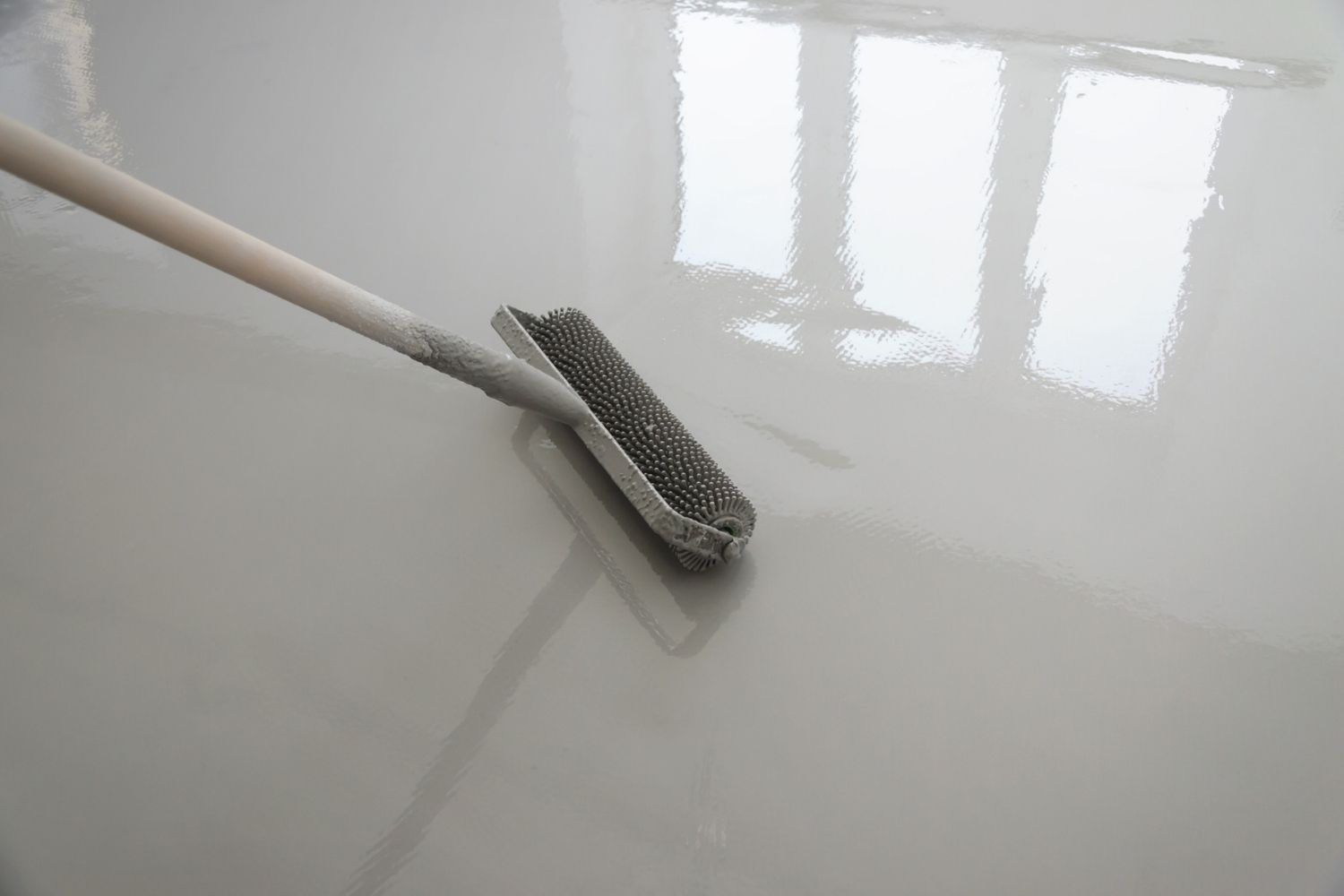
- Get multiple estimates. Homeowners will want to search out at least three estimates from reputable concrete flooring companies in their area. Estimates are usually free but it’s always smart for homeowners to double-check with the company.
- Time it right. Homeowners will want to consider doing the project in late fall or winter. Contractors will lower prices during their slow time, and this is a good way to get a cheaper rate.
- Negotiate. It’s possible to negotiate better prices with flooring companies. Some will lower their costs by up to 20 percent.
- Do some of the work yourself. Homeowners can save on labor costs by moving everything out of the garage themselves and taking it to a storage space. This can save on the cost of movers.
- Bundle. Homeowners can save money on epoxying a garage floor if they’re building a garage or remodeling one. Since contractors are already at the home doing the work, the homeowner may be able to get a discount on the price of installing an epoxy floor.
Questions to Ask a Pro
Asking a professional the right questions about epoxy garage floor cost can minimize miscommunication, save money, and get the desired results. There are several questions homeowners can ask an epoxy flooring professional.
- Are you insured, and do you have workers’ compensation?
- Do you have references or recommendations?
- What brand of epoxy coating do you use?
- Do you have technical data sheets about the epoxy you use that I can see?
- Are you certified to apply epoxy coating?
- Can I see your training certificate?
- How will you prep the existing concrete floor?
- What are the VOC levels in the products you use?
- How long will the project take?
- Who will be applying the epoxy?
- Do you test for moisture in the flooring?
- Do you offer a topcoat?
- How will you handle concrete flooring repairs?
- What type of warranty do you offer?
FAQs
Deciding on epoxy garage flooring while staying within a budget can be a daunting process. There are several frequently asked questions about epoxy flooring to help guide the decision making process for homeowners.
The cost to epoxy a garage floor in a 360-square-foot 2-car garage is approximately $1,100 to $4,300.
Epoxy flooring typically lasts between 10 and 20 years if it’s properly maintained. Solid epoxy flooring is typically the longest-lasting option.
Garage floor tile can cost $3 to $5 per square foot, and epoxy can run between $3 and $12 per square foot.
Angi, HomeAdvisor, HomeGuide
